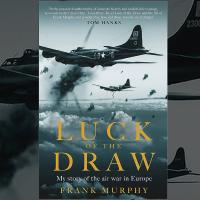There is something about the Second World War that draws people to it. Often at the exasperation of historians of other eras, it catches the interest and the imagination. The history shelves of bookshops are filled with volumes discussing the war, television shows and films still turn to it at every available opportunity, festivals worldwide are dedicated to it. Perhaps one reason is that, unlike the trials and tribulations of other periods, it remains just within living memory. The men and women who fought and experienced the war are not long dead: there are still survivors doing the book tour and festival circuits, and the vast majority of the reading public have memories of parents or grandparents who were actually there. The more we read about the Second World War, the more we come to understand the enormity of what they went through. Our parents and grandparents become the heroes.
This is never more the case than with a memoir, well written, full of drama, despair, and occasional delight, but also packed with a disarming honesty and humility. And Frank Murphy's Luck of the Draw hits the mark precisely. Murphy, at only 20 years of age, volunteered to join the United States Army Air Forces just after the attack on Pearl Harbour, becoming the navigator on Crew No. 31 of the 'Bloody Hundredth', part of the 'Mighty' Eighth Air Force that ran the gauntlet of the daytime bombing campaign over Europe. Unsurprisingly given that the chance of completing the required 25 missions was statistically zero, he was shot down and spent the last 18 months of the war as a prisoner first in the famed Stalag Luft III and later in the damp, dreadful conditions at Moosburg – a 110,000-man prison designed to hold 10,000. Even by the standards of the day, it is a remarkable story.
It is little wonder, then, that the book – originally published in 2001 – has run to a new edition, timed to coincide with the new Spielberg/Hanks mini-series Masters of the Air. It is a great resource on which to draw. But as well as the facts, which can be found in countless books, Luck of the Draw – as with many memoirs – provides that human aspect. Murphy speaks of his own feelings – his fear, his anguish, his exhilaration, his hope, his desperation – with his own voice. As much as is possible for non-combatants, we experience with him the adrenalin of a raid, the hellishness of flak, the awfulness of forced marches and days locked in stinking, filthy boxcars. It feels visceral; it feels real. His Southern drawl is almost audible, his style of writing makes him seem present, in the room, having a conversation. It is the sort of conversation I wish I could have had with my own, RAF navigator, grandfather.
But unlike many memoirs, which can fudge the details either through the haze of distant memory or for more nefarious reasons, Murphy's book is good history. In writing it, he contacted and became friends with a number of historians and specialists, asking them to fact-check and provide objective opinion. He spent weeks pouring over dry lists of names, places, and missions to ensure he was as accurate as possible. He took the time to do proper research. Much of this can be found in the voluminous appendices – almost as long as the book itself – and also in footnotes and asides throughout. As well as a work of recollection, it is also, therefore, a work of scholarship.
This adds to, rather than detracts from, Luck of the Draw. Nothing can get across the sheer weight of the lives lost better than the lists of aircraft names, crew members, and what happened to them that are included in the text, for example. And placing each battle in its context enforces the reality. There is also the willingness to engage with difficult conversations, whether on the alleged incompetence of the Bloody Hundredth or on the effectiveness, and morality, of the strategic bombing campaign. It is one of the most honest, disinterested memoirs I have had the pleasure to read. It is a tribute not just to Murphy himself, but to all the brave men who, in Murphy's words, had 'to cope with mental and physical stresses [that] no one should ever be asked to endure.' Luck of the Draw provides that abiding voice that will haunt readers for generations after the last few survivors have gone. And although Frank Murphy himself passed in 2007, his spirit – and those of his comrades – lives on through it.
Luck of the Draw provides that abiding voice that will haunt readers for generations after the last few survivors have gone. And although Frank Murphy himself passed in 2007, his spirit – and those of his comrades – lives on through it.


